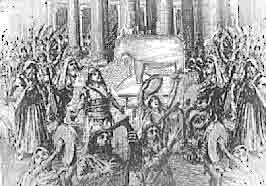

![]()
![]()
|
Newsletter of the District of Asia November-December 1999 EDITORIAL “ The kings of the earth stood up, and the princes met together, against the Lord, and against his Christ. “ - Psalm II, 2
When we read Sacred Scripture, the Old Testament in particular, the sin for which the Chosen People was the most frequently chastised, the temptation which was the greatest - against which God gave all the mosaic laws and rituals, (St Thomas) – were the sins against the very First Commandment, the worship of idols. Throughout Genesis (the Golden Calf), the book of Kings (the fall of Salomon, cf. III Kg 11), the Prophets (Elias: “Lord, I am alone against 450 priests of Baal!” III Kings 18), the whole history of the Kings of Israel (the bad kings allowed false worship, the good ones destroyed the idols, see III & IV Kings), the story of the Macchabees (the beautiful reaction of Mathathias and his sons, “a priestly family!”), always is the First Commandment at stake in the critical moments. And among the sins against the First Commandment - which are the most grievous sins - the most grievous is idolatry. St Thomas Aquinas, the Common Doctor of the Church, teaches the following in his Summa, II-II, 94, 3:
“The gravity of a sin may be considered in two ways. First, on the part of the sin itself, and thus idolatry is the most grievous sin. For just as the most heinous crime in an earthly commonwealth would seem to be for a man to give royal honor to another than the true king, since, so far as he is concerned, he disturbs the whole order of the commonwealth, so, in sins that are committed against God, which indeed are the greater sins, the greatest of all seems to be for a man to give God's honor to a creature, since, so far as he is concerned, he sets up another God in the world, and lessens the divine sovereignty. Secondly, the gravity of a sin may be considered on the part of the sinner. Thus the sin of one that sins knowingly is said to be graver than the sin of one that sins through ignorance: and in this way nothing hinders heretics, if they knowingly corrupt the faith which they have received, from sinning more grievously than idolaters who sin through ignorance. Furthermore other sins may be more grievous on account of greater contempt on the part of the sinner.
“Objection 1. It would seem that idolatry is not the gravest of sins. The worst is opposed to the best (Ethic. viii, 10). But interior worship, which consists of faith, hope and charity, is better than external worship. Therefore unbelief, despair and hatred of God, which are opposed to internal worship, are graver sins than idolatry, which is opposed to external worship. “Reply to Objection 1. Idolatry presupposes internal unbelief, and to this it adds undue worship. But in a case of external idolatry without internal unbelief, there is an additional sin of falsehood as it was stated above in art. 2. (Art. 2: Since outward worship is a sign of the inward worship, just as it is a wicked lie to affirm the contrary of what one holds inwardly of the true faith so too is it a wicked falsehood to pay outward worship to anything counter to the sentiments of one's heart.) “Objection 2. Further, the more a sin is against God the more grievous it is. Now, seemingly, a man acts more directly against God by blaspheming, or denying the faith, than by giving God's worship to another, which pertains to idolatry. Therefore blasphemy and denial of the faith are more grievous sins than idolatry. “Reply to Objection 2. Idolatry includes a grievous blasphemy, inasmuch as it deprives God of the singleness of His dominion and denies the faith by deeds." Seeing the abominations (idolatry purely and simply encouraged) of the meeting of religions which took place in Assisi in 1986 having been repeated in Assisi and in Rome this last October 24-28, one wonders if the authorities of the Church have forgotten the following texts, which are all well known passages of the Divine Writ. I pray that all our readers will not forget them and will be strengthened at the sight of some of the heroes of the Old Testament who had so much less than we do and who held on to the faith in the most adverse conditions. May God bless you all during the coming Advent and Christmas seasons, during the new millennium but especially during all eternity. Fr
Daniel Couture |

